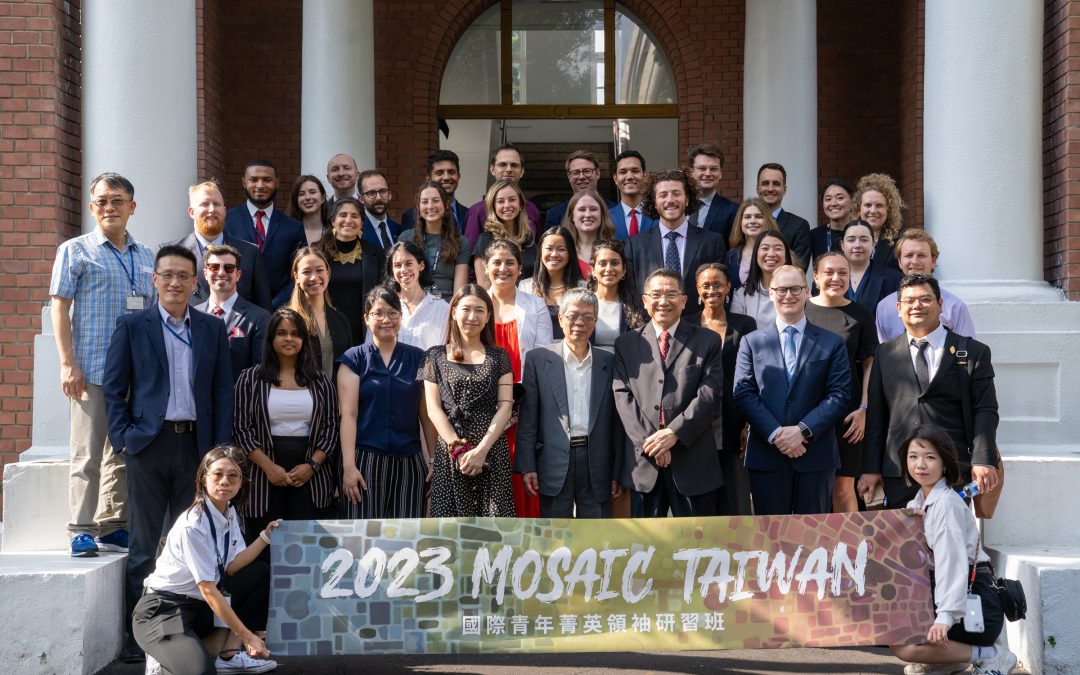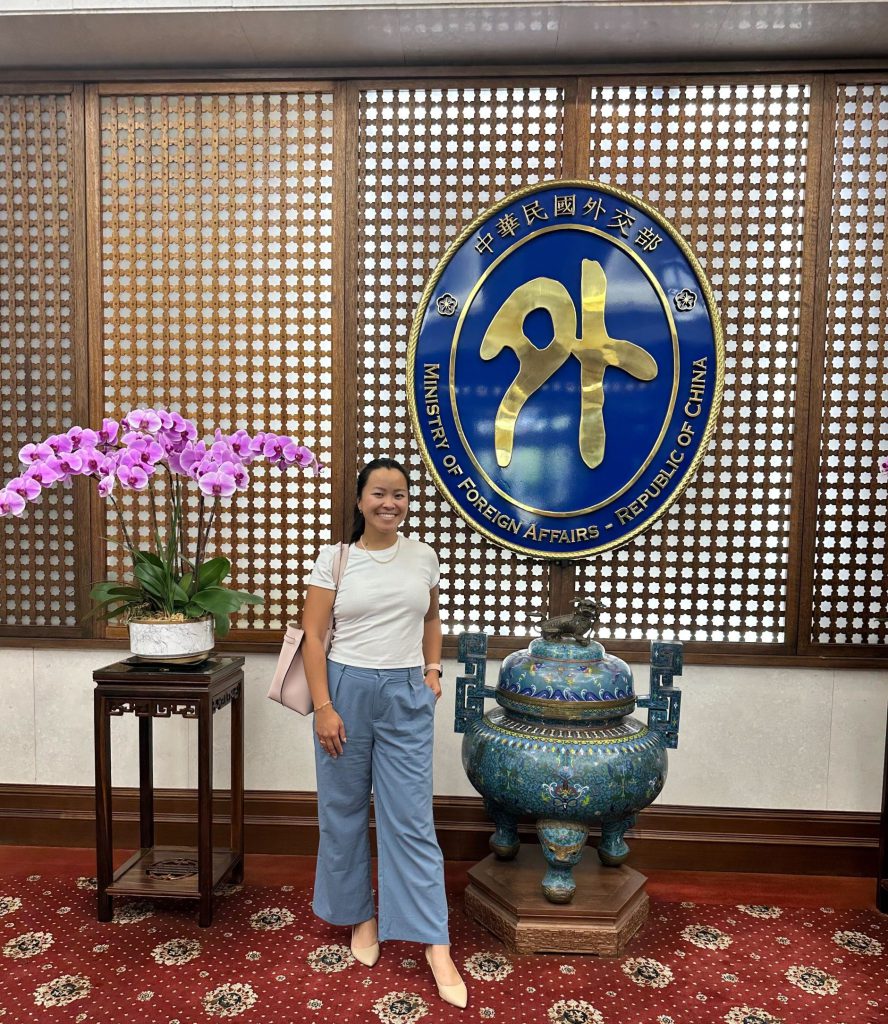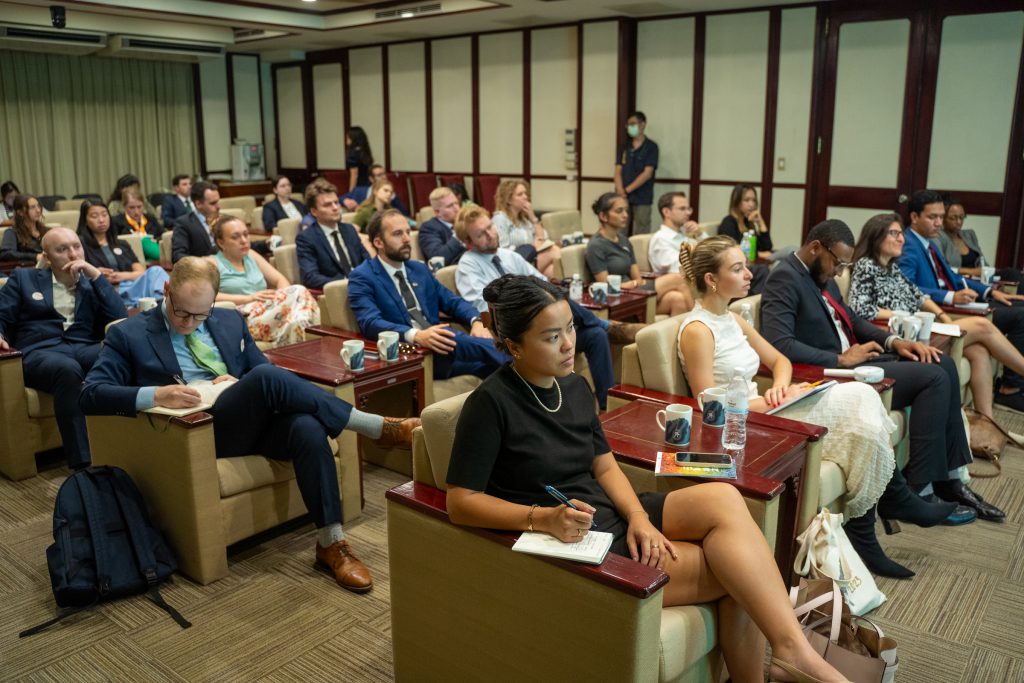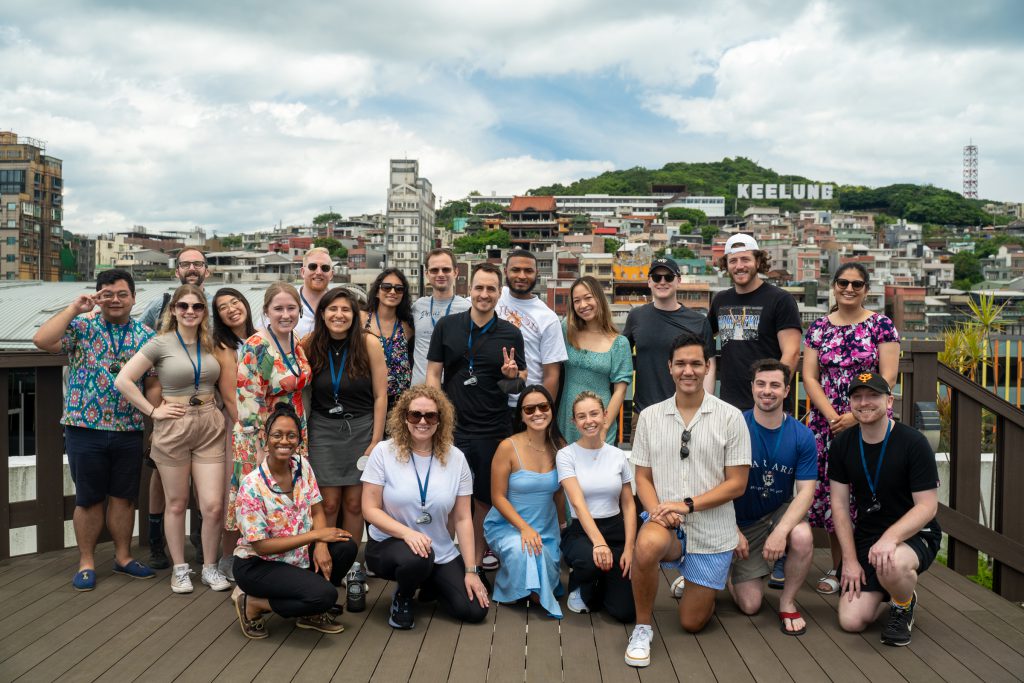US-Taiwan Business Council Director of Corporate Affairs Rebecca Lind recently traveled to Taiwan as a participant in the MOSAIC Fellowship Program for 2023. USTBC is grateful to Taiwan’s Ministry of Foreign Affairs for giving Rebecca the opportunity to participate in this important program for emerging young leaders, while also giving her the chance to visit Taiwan for the first time. Rebecca has been a part of the Council’s team since 2019, and has been closely studying the island and actively promoting stronger U.S.-Taiwan relations. Having this extensive on-the-ground experience in Taiwan is invaluable for her ongoing work at the USTBC.
During her visit to Taiwan, Rebecca immersed herself in Taiwan’s rich culture, history, and dynamic economic and political landscape. Along with 30 other fellows from North America, she was also able to explore Taipei, Keelung, and Tainan. The fellowship program required engaging with representatives from Taiwan’s government and non-profit sector, attending meetings that facilitated valuable exchanges and insights. In addition, the fellows took part in a one-day forum focused on “Promoting Taiwan Through New Media” and “Defeating Disinformation,” highlighting the significance of utilizing media platforms to effectively represent Taiwan’s interests and combat misinformation.
Commenting on her Taiwan visit, Rebecca said:
Participating in the MOSAIC program was truly an important and once-in-a-lifetime opportunity. The experience provided me with an unparalleled introduction to Taiwan. As a MOSAIC fellow, I had the privilege of experiencing Taiwan not only as a tourist but also as a young professional eager to expand my knowledge and understanding of this remarkable island. The intricacies and nuances that come with working in Taiwan can only be fully comprehended by immersing oneself in its culture and society.
During my two weeks in Taipei, the Ministry of Foreign Affairs (MOFA) took us to various meetings that provided valuable insights into Taiwan’s politics, business landscape, and economic prosperity. Our first visit was to the Institute for National Defense and Security Research (INDSR). Research Fellow and Director Dr. Si-Fu Ou and five of his esteemed colleagues hosted us during the visit. Dr. Ou gave us a comprehensive presentation on INDSR’s developments in science and space technology, and on Taiwan’s defense capabilities. This was coupled with a discussion on the significant role of the United States as a crucial partner in bolstering Taiwan’s defense capabilities. During the Q&A session, Dr. Ou explored how the institute is adapting its perspective in response to advancements in technology and media. This is timely, particularly given the growing use of AI and social media as means of foreign espionage.
Rebecca Lind at the Ministry of Foreign Affairs
We were also honored to receive an invitation to the MOFA office, where the Deputy Director-General of the Department of North American Affairs, Mr. Jason Poyuan Ma, provided us with a comprehensive briefing. Mr. Ma shared Taiwan’s key priorities in its collaboration with North America, which revolve around security, economic cooperation, and the promotion of shared values. He also underscored the significance of cultural exchanges and the fostering of people-to-people relationships as essential pillars of Taiwan’s engagement with North America. This was particularly interesting to me, as I have primarily worked with Taiwan through political and non-governmental engagement. Recognizing the significance of understanding culture as a vital aspect of truly knowing Taiwan, especially when introducing it to foreigners, was eye-opening. At the end of his briefing, Mr. Ma discussed Taiwan’s interest in pursuing a Bilateral Trade Agreement (BTA) with the U.S. and the benefits and opportunities that such an agreement could offer for both Taiwan and its partners. I have worked extensively with the USTBC’s efforts on promoting a BTA, and it is clear to me that there is much to be gained from signing such an agreement. However, Mr. Ma also recognized that this is a complex endeavor that will take significant effort to achieve.
MOSAIC Fellows at a briefing by Jasmine Huang from SEMI
Towards the end of our trip, my fellows and I visited the National Development Council (NDC) and the Legislative Yuan (LY), where we were treated to a tour of the grounds. At the NDC, Ms. Connie Chang gave an overview of the initiatives they were working on to spur economic growth and social development. Ms. Chang is the Director-General of the Department of Overall Planning at the NDC. She was very knowledgeable and well spoken. Her brief on the 5+2 program was comprehensive and gave insight into the great progress they were making. The visit to the LY was just as successful, as we were given an inside look at Taiwan’s governmental structure. During our tour, we saw how different branches of Taiwan’s government collaborate to solve the challenges they face on a day-to-day basis. We also learned about the roles of various committees, the legislative procedures, and the ways in which lawmakers engage with constituents to ensure that their voices are heard.
In addition to these significant meetings and site visits, the MOSAIC fellows and I were treated to several uniquely-Taiwan experiences. Notably, we were given a tour of the National Human Rights Museum. Within is the Jing-Mei White Terror Memorial Park, an enduring reminder of Taiwan’s White Terror period and the atrocities that occurred. While there, we were given a personal recount of injustice and resilience by a Malaysian victim of the White Terror. The injustice he faced is unfathomable, and it was inspiring to see him courageously speak about his former place of captivity. I am thankful to experience Taiwan in this light, and appreciative of the effort MOFA made to give us a holistic Taiwan historical experience.
We also took tours of the Grand Hotel Taipei and several Confucius temples in Taiwan. The opulence of the Grand Hotel Taipei and its architecture was truly remarkable and gave us a glimpse into Taiwan’s rich history. While we spent most of our time in Taipei, we took the High-Speed Rail down to Tainan to experience a different part of the island. I enjoyed the rural feel of Tainan in comparison to the buzzing city-life in Taiwan’s capital. Although Taipei is particularly known for their superb and accessible transportation, I found Tainan to be equally accessible. I also thoroughly enjoyed a more personal experience there walking through unfinished roads. My favorite memory of Tainan is being taught the correct dragon boating technique; it was quite the unique experience! (Unfortunately, I’m nowhere near race ready.) Finally, we traveled north to Keelung to learn about the port city’s importance as a global shipping hub. The Yang Ming Oceanic Culture & Art Museum’s Global Container Transportation Exhibition provided an in-depth look into the crucial shipping industry and the consistent flow of commerce in and out of Taiwan.
MOSAIC Fellows pose in Keelung
As an avid foodie, I reveled in eating my way through Taiwan. Din Tai Fung, of course, was a highlight – their soup dumplings certainly lived up to the high expectations. I was also thoroughly impressed by the selections of food and delicacies at Taiwan’s celebrated night markets. It’s amazing how you can taste so many unique dishes all in one place. I particularly enjoyed the fried chicken and scallion pancakes. Obviously, I had to try stinky tofu. While I wasn’t the biggest fan, I can tell it’s a huge local hit by the numerous stands I passed (and smelled) selling it. I was excited when we visited a hot pot restaurant towards the end of the trip. That was truly my favorite meal. (If I could eat hot pot enoki mushrooms every day, I happily would!)
Thanks to MOFA and the MOSAIC program, I brought back a nuanced understanding of Taiwan’s role in the world, and a renewed commitment to work towards further strengthening the U.S.-Taiwan relationship. I’d like to thank Rupert Hammond Chambers, Brian Davis, and Randall Schriver for referring me to this program; I am honored by your support. I am truly thankful to have been a MOSAIC fellow during this trip, and hope to make it back to Taiwan soon.
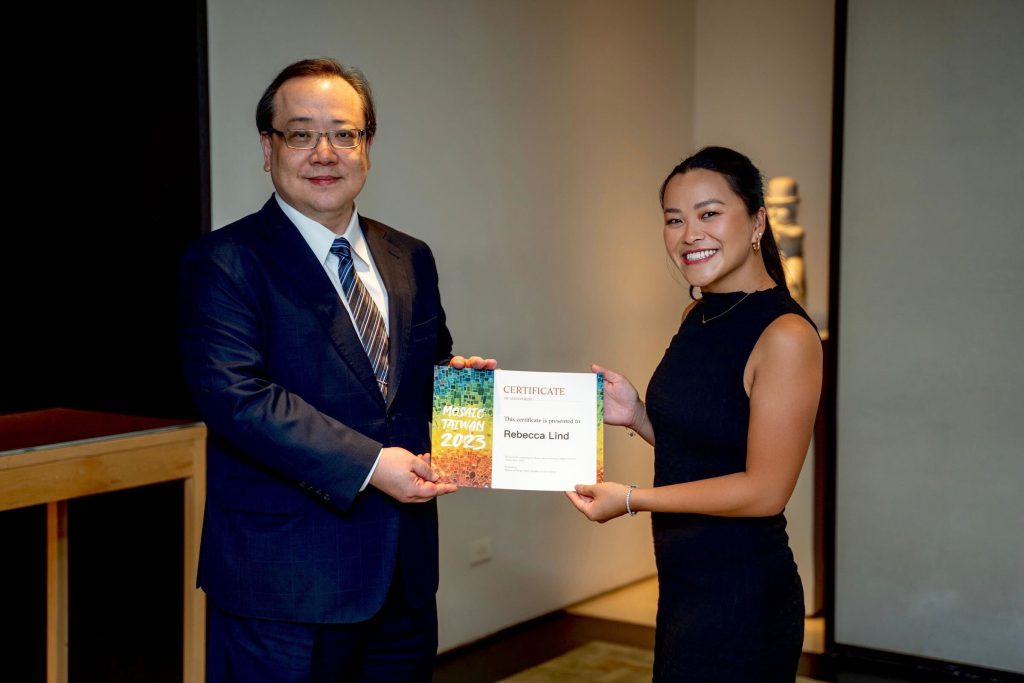
Rebecca Lind receives her MOSAIC Certificate from the Ministry of Foreign Affairs
USTBC recommends that other young leaders apply for this competitive program. The MOSAIC fellowship runs annually each summer, and the Taipei Economic and Cultural Representative Office (TECRO) and each of the Taipei Economic and Cultural Offices (TECO) around the United States publish information on the application process.
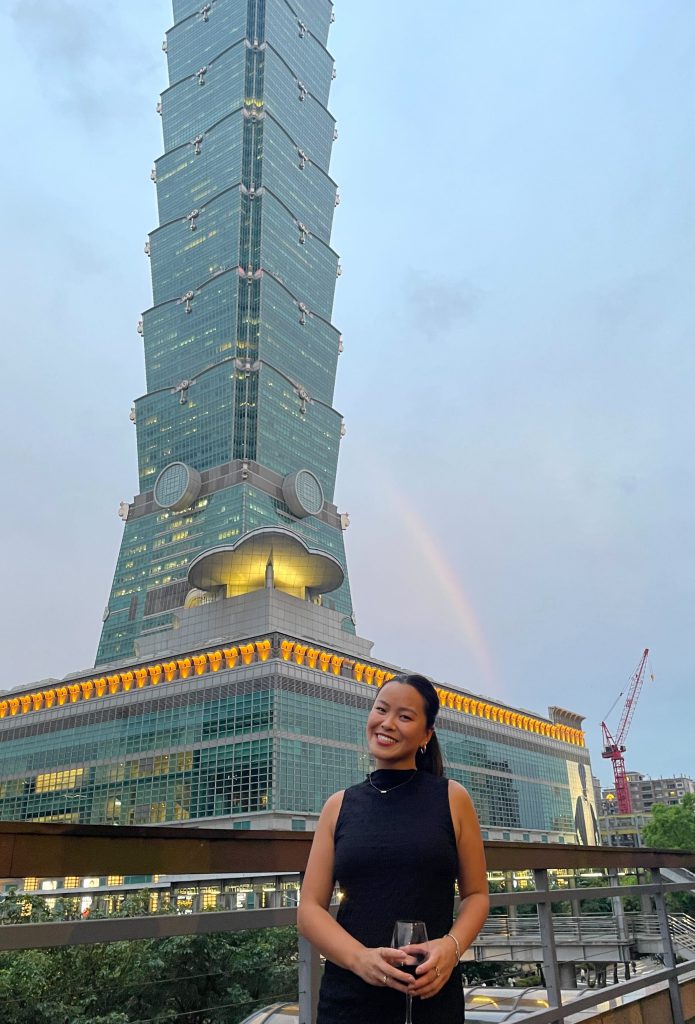
Rebecca Lind in front of Taipei 101

